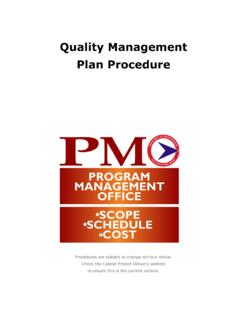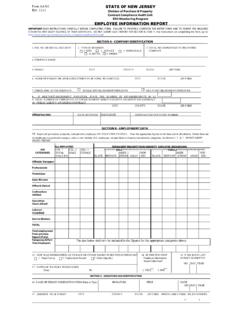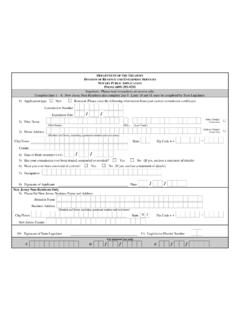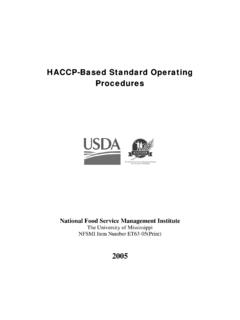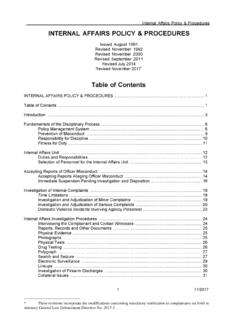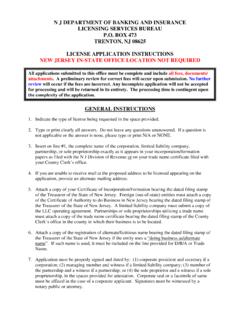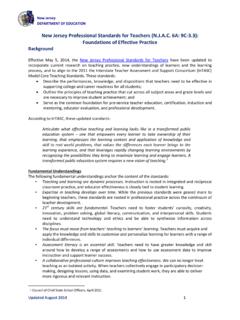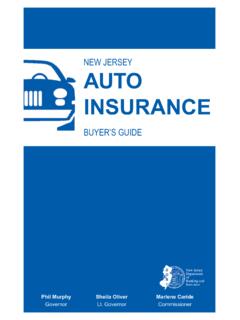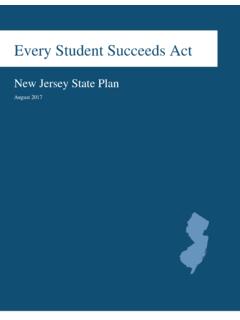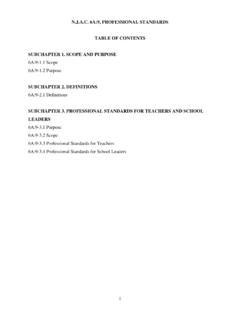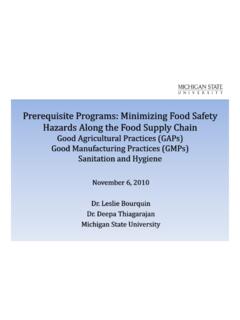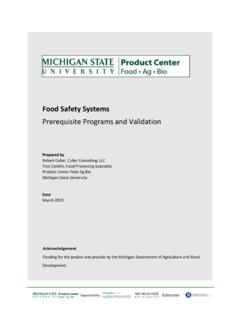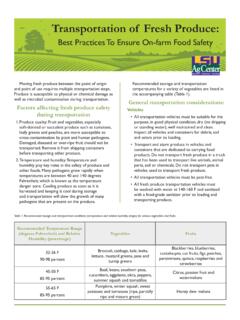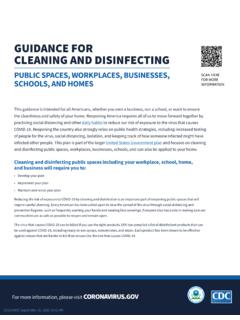Transcription of TABLE OF CONTENTS - State
1 1 TABLE OF CONTENTS Subchapter 1. GENERAL PROVISIONS Violations Severability Purpose Scope Definitions Subchapter 2. MANAGEMENT & PERSONNEL Supervision Employee health Personal cleanliness Hygienic practices Subchapter 3. FOOD Characteristics Sources, specs, original container & records Protection from contamination after receiving Destroying organisms of public health concern Limiting organisms of public health concern Food identity, presentation & on-premises labeling Highly susceptible populations Subchapter 4. EQUIPMENT, UTENSILS & LINENS Materials for construction & repair Design & construction Equipment, utensils, numbers & capacities Equipment location & installation Maintenance & operation Cleaning of equipment & utensils Sanitization of equipment & utensils Manual warewashing equipment Mechanical warewashing equipment Laundering Protection of clean items Vending machines Subchapter 5.
2 WATER, PLUMBING & WASTE Water Plumbing system Mobile water tank & mobile food retail food establishment water tank Sewage, other liquid wastes & rainwater Refuse, recyclables, & returnables Subchapter 6. PHYSICAL FACILITIES Materials for construction and repair Design, construction, and installation Lighting, ventilation, and dressing areas Segregation & location of distressed merchandise Maintenance & operation Toilet facilities Handwashing facilities Subchapter 7. POISONOUS or TOXIC MATERIALS Labeling and identification Operational supplies & applications Stock & retail sale Subchapter 8. ENFORCEMENT PROVISIONS Legal authority Inspection of retail food establishments Examination of records Examination & condemnation of unwholesome, contaminated or adulterated food & drink Retail food establishments outside jurisdiction Emergency occurrences Salvaged food Closure for infection Penalties Report of inspections Evaluation of reports Public posting of inspection reports Public availability of inspection reports Interpretations Subchapter 9.
3 REVIEW of PLANS Submission and approval Pre-operational inspection Subchapter 10. ADDITIONAL REQUIREMENTS Choking prevention posters Smoking in restaurants & food stores Effective Date: January 2, 2007 CHAPTER 24 ( 8:24) sanitation in Retail Food Establishments and Food and Beverage Vending Machines NJ Department of Health & Senior Services Consumer & Environmental Health Services Food & Drug Safety Program (609) 588-3123 2 Subchapter 1. GENERAL PROVISIONS 8 Violations; declaration of nuisances Retail food establishments in violation of this chapter are hereby declared to be nuisances, hazardous to health. 8 Severability If any provision or application of any provision of this chapter is held invalid, that invalidity shall not affect other provisions or applications of this chapter.
4 8 Purpose The purpose of this chapter is to safeguard public health and provide to consumers food that is safe and unadulterated. 8 Scope This chapter establishes definitions; sets standards for management and personnel, food operations, and equipment and facilities; and provides for retail food establishment plan review, inspection, and employee restrictions. 8 Definitions For the purpose of this chapter, the following words, phrases, names and terms shall have the following meanings, unless the context clearly indicates otherwise. "Accredited program" means a food protection manager certification program that has been evaluated and listed by an accrediting agency as conforming to national standards for organizations that certify individuals. The term refers to the certification process and is a designation based upon an independent evaluation of factors such as the sponsor's mission; organizational structure; staff resources; revenue sources; policies; public information regarding program scope and eligibility requirement; recertification, discipline and grievance procedures; and test development and administration.
5 The term does not refer to training functions or education programs . "aw" means water activity which is a measure of the free moisture in a food, is the quotient of the water vapor pressure of the substance divided by the vapor pressure of pure water at the same temperature, and is indicated by the symbol aw. "Beverage" means a liquid for drinking, including water. "Bottled drinking water" means water that is sealed in bottles, packages, or other containers and offered for sale for human consumption, including bottled mineral water. "Certification number" means a unique combination of letters and numbers assigned by a shellfish control authority to a molluscan shellfish dealer according to the definition stated in the Department of Health and Human Services, Public Health Service, Food and Drug Administration, National Shellfish sanitation Program's Guide for the Control of Molluscan Shellfish (2003), incorporated herein by reference, as amended and supplemented, and available through the Interstate Shellfish sanitation Conference, 209-2 Dawson Road, Columbia, SC 29223, and available at ~.
6 "CIP" means cleaned in place by the circulation or flowing by mechanical means through a piping system of a detergent solution, water rinse, and sanitizing solution onto or over equipment surfaces that require cleaning, such as the method used, in part, to clean and sanitize a frozen dessert machine. The term does not include the cleaning of equipment such as band saws, slicers, or mixers that are subjected to in place manual cleaning without the use of a CIP system. "CFR" means Code of Federal Regulations. "Commercially raised game animal" means game animals: 1. Commercially raised for food and raised, slaughtered, and processed under a voluntary inspection program that is conducted by the agency that has animal health jurisdiction; or 2. Under a voluntary inspection program administered by the USDA for game animals such as exotic animals (reindeer, elk, deer, antelope, water buffalo, or bison) that are "inspected and approved" in accordance with Exotic Animals; Voluntary Inspections, 9 CFR Part 352, incorporated herein by reference, as amended and supplemented, or rabbits that are "inspected and certified" in accordance with Voluntary Inspection of Rabbits and Edible Products Thereof, 9 CFR Part 354, incorporated herein by reference, as amended and supplemented.
7 "Color additive" has the meaning stated in the Federal Food, Drug, and Cosmetic Act, 21 321(t) and 21 CFR (f) and , both incorporated herein by reference, as amended and supplemented. 8:24 Subchapter 1. General Provisions 3"Comminuted" means reduced in size by methods including chopping, flaking, grinding, or mincing. The term includes fish or meat products that are reduced in size and restructured or reformulated such as gefilte fish, gyros, ground beef, and sausage; and a mixture of two or more types of meat that have been reduced in size and combined, such as sausages made from two or more meats. "Confirmed disease outbreak" means a foodborne disease outbreak in which laboratory analysis of appropriate specimens identifies a causative agent and epidemiological analysis implicates the food as the source of the illness.
8 "Consumer" means a person who is a member of the public, takes possession of food, is not functioning in the capacity of an operator of a retail food establishment or food processing plant, and does not offer the food for resale. "Corrosion-resistant material" means a material that maintains acceptable surface cleanability characteristics under prolonged influence of the food to be contacted, the normal use of cleaning compounds and sanitizing solutions, and other conditions of the use environment. "Critical control point" means a point or procedure in a specific food system where loss of control may result in an unacceptable health risk. "Department" means the New Jersey Department of Health and Senior Services. "Drinking water" means water that meets the provisions of the NJSDWA, is traditionally known as "potable water" and includes the term "water," except where the term used connotes that the water is not potable, such as "boiler water," "mop water," "rainwater," "wastewater," and "nondrinking" water.
9 "Dry storage area" means a room or area designated for the storage of packaged or containerized bulk food that is not potentially hazardous and dry goods such as single service items. "Easily cleanable" means a characteristic of a surface that: 1. Allows effective removal of soil by normal cleaning methods; and 2. Is dependent on the material, design, construction, and installation of the surface. "Easily movable" means: 1. Portable; mounted on casters, gliders, or rollers; or provided with a mechanical means to safely tilt a unit of equipment for cleaning; and 2. Having no utility connection, a utility connection that disconnects quickly, or a flexible utility connection line of sufficient length to allow the equipment to be moved for cleaning of the equipment and adjacent area. "Employee" means the operator, person in charge, person having supervisory or management duties, person on the payroll, family member, volunteer, person performing work under contractual agreement, or other person working in a retail food establishment.
10 "EPA" means the Environmental Protection Agency. "Equipment" means an article that is used in the operation of a retail food establishment such as a freezer, grinder, hood, ice maker, meat block, mixer, oven, reach-in refrigerator, scale, sink, slicer, stove, TABLE , temperature measuring device for ambient air, vending machine, or warewashing machine. The term does not include items used for handling or storing large quantities of packaged foods that are received from a supplier in a cased or overwrapped lot, such as hand trucks, forklifts, dollies, pallets, racks, and skids. "Fish" means fresh or saltwater finfish, crustaceans and other forms of aquatic life (including alligator, frog, aquatic turtle, jellyfish, sea cucumber, and sea urchin and the roe of such animals) other than birds or mammals, and all mollusks, if such animal life is intended for human consumption.
